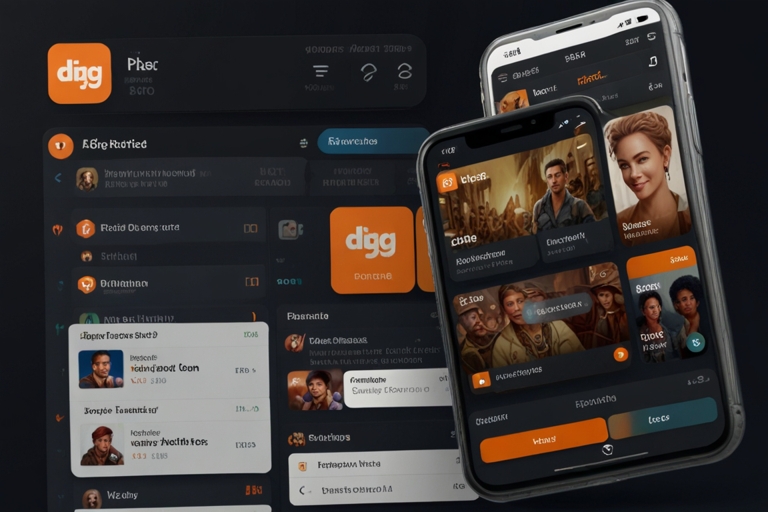
TL;DR
- Digg has relaunched as a Reddit-style social news platform designed for the AI age.
- Co-founded again by Kevin Rose (original Digg founder) and Reddit’s Alexis Ohanian, the platform aims to foster authentic human conversations amid rising bot activity.
- The iOS app is in alpha testing with early adopters in its “Groundbreakers” community.
- New features include AI-generated summaries, community feeds, and time-bound leaderboards with user achievements.
- Digg is experimenting with zero-knowledge proofs and identity verification to keep bots out.
Digg Reboots as Reddit Alternative Focused on AI-Era Authenticity
Once valued at $175 million, Digg was a pioneer in online content aggregation and community voting long before Reddit became a household name. Now, in 2025, Digg is making a bold return, rebuilt for a new generation of users—and internet challenges.
Led by Kevin Rose and Alexis Ohanian, the rebooted Digg is being positioned as a human-centric social platform aimed at restoring trusted content discovery in a digital landscape increasingly dominated by AI bots and automated content.
“We’re entering an internet flooded with AI agents and bots. Users will demand authentic spaces,” say the founders in Digg’s vision statement.
Key Features of Rebooted Digg
| Feature | Description | Source |
| Founders | Kevin Rose (Digg), Alexis Ohanian (Reddit) | TechCrunch |
| App Availability | iOS Alpha via Groundbreakers Early Access | Digg App Page |
| Authentication Focus | Zero-knowledge proofs for human verification | Digg Community AMA |
| AI Features | News summarization, no “Explain like I’m 5” yet | Digg iOS Announcement |
| Communities Available | Art, Tech, Finance, Food, AMA, Sports, Science, Entertainment | Digg App Preview |
| User Gamification | Gems, Achievements, Leaderboards (time-bound, daily reset) | Digg Blog |
| Planned Features | AI-powered community builders via LLMs | Kevin Rose AMA |
A Clean, Modern Design—With Familiar Functions
The current alpha version of Digg is available only via its iOS app, shared with a limited group of early adopters called Groundbreakers. The user interface brings a streamlined, clean layout with a bottom navigation bar that separates sections like:
- Home Feed
- Search
- Leaderboards
- User Profiles
Each of these mimics Reddit’s structure but avoids overwhelming the user, emphasizing quality over clutter.
Feeds include content filters like “Most Digg,” “Trending,” “Newest,” and “Heating Up.” These views are adjustable across all of Digg or tailored to your personal community feed.
Small But Growing Communities—and No User-Created Ones Yet
While Reddit thrives on its vast, user-generated communities, Digg currently offers only a limited selection of pre-built interest groups, including:
- Art
- Music
- Technology
- Food
- Finance
- Science
- AMA (Ask Me Anything)
- News
- Entertainment
Users cannot yet create custom communities, but this feature is expected to be introduced in future updates. Until then, Digg’s current groups provide a curated testing ground for evaluating how users engage with different types of content.
AI-Powered News Summarization—With Room to Grow
Digg’s reboot is banking on AI as a value-add, particularly in the realm of content summarization. Each shared article comes with a machine-generated summary, similar to tools seen in now-defunct Artifact (sold to Yahoo) and newer apps like Particle.
Unlike those competitors, Digg has not yet integrated deeper summarization options, such as:
- “Explain like I’m 5” modes
- Opposing perspective breakdowns
- Source reliability grading
These may come later, but for now, Digg is using plain summarization as a first step.
Gamification: Gems, Leaderboards, and User Achievements
Digg is leaning into a mild gamification model, offering users “Gems” for being early to share trending content. Additional incentives include:
- Leaderboard rankings for top daily posts
- User stats like profile views, engagement rates, and Gem counts
- Time-limited leaderboards that reset every 24 hours to prevent domination
This change addresses prior issues from Web 2.0-era Digg, where power users manipulated leaderboards through coordinated campaigns or pay-for-placement schemes.
Still, Digg remains cautious. Company insiders shared that gamification elements are being dialed back on the desktop version based on initial feedback.
UI Tweaks Still in Progress
While generally well-received, the rebooted Digg app has some early design hiccups. One example: the upvote/downvote icons, which are stylized as hand gestures, are too ambiguous, making it unclear which is up or down.
This minor UX confusion illustrates that user interface design is still a work-in-progress—a fair trade-off for an alpha release, but one that may need to be prioritized before a wider public rollout.
Verification for the AI Era: Zero-Knowledge Proofs
One of Digg’s most innovative goals is using zero-knowledge proofs or similar technology to ensure only verified humans can post or comment. This would help solve the platform’s central issue: AI-generated spam and bot-led community manipulation.
The team hasn’t rolled this out yet, but it signals a crypto-adjacent approach to identity and trust, something increasingly relevant in 2025 as LLMs flood the web with synthetic content.
The Bigger Vision: AI-Powered Community Builders
Digg is also planning to use large language models (LLMs) for more than just summaries. During a recent AMA with Kevin Rose, he hinted at future features like:
“Eventually you’ll be able to talk to Digg’s AI and say: ‘Make my community look like this. Add a widget. Change the layout.’ It’s like prompting your subreddit design with natural language.”
This could enable users to create personalized communities using intuitive, voice-based or chat-based interfaces—potentially a first in social platforms.
Why Digg, Why Now?
With Reddit undergoing monetization-driven changes (like API pricing controversies), and AI transforming how content is surfaced and evaluated, Digg’s return may be strategically timed.
Still, the app has a long way to go in answering its core value proposition:
- Why switch from Reddit?
- How is Digg tangibly better?
- Will human-first design win in an AI-saturated world?
As Digg continues its test phase, the answers may arrive in user-created communities, LLM-enhanced experiences, and a trust model that puts humans first.




